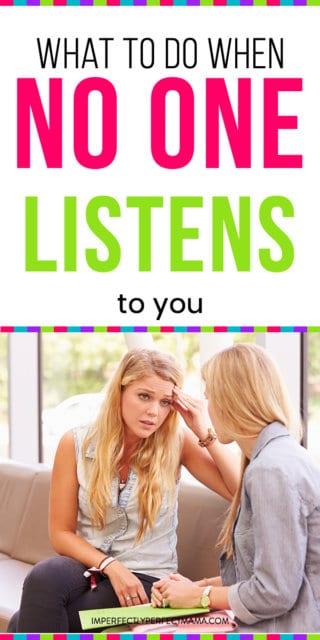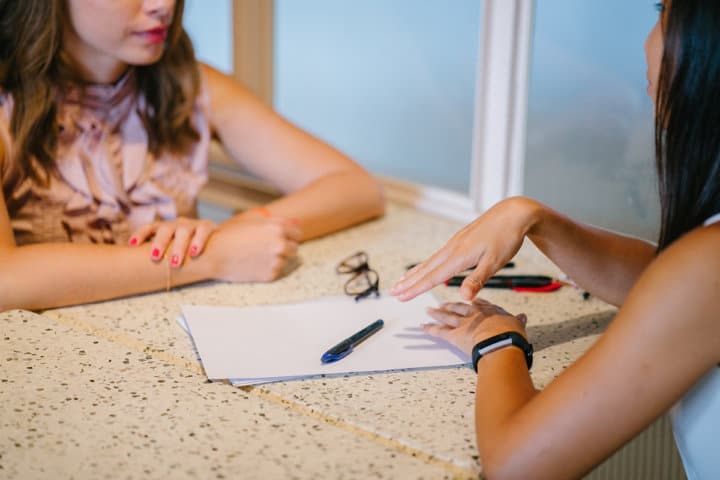We’ve all been there –

You’re in a conversation trying to explain a struggle you’re having.
The other person’s response? “Oh! I know exactly what you mean! One time my…” Frustrating. Frustrating!
You’re looking for empathy, support, and a listening ear but the focus is directed back to the other person.
Being in situations like this has caused me to step back and take a look at what conversation actually is, why we need it, and what a gift it can be to each other.
A New Definition of Late
I’m a mom of a very late walker.
Actually, I have a very late not-yet-walker. At the time I’m writing this piece my daughter is 28 months, almost two and a half years, and still has not taken her first steps.
We are in occupational therapy, her doctor has no further suggestions, and we’re doing the best we can. But we (my husband and I) are exhausted.
So exhausted! Our lives with a 2.5 year old look much different than others.
If we’re at the playground she can’t “just play.” I have to carry her around from slide to swing to merry-go-round to keep up with her brother.
She’s happy being carried, but I’m exhausted by the end!
She’s developmentally ready to “walk” by the cart in the grocery store but lacks the motor skills to do so. So she cries the whole time to be down with her brother!
At birthday parties she doesn’t get to play with other kids; while they run around she is anchored to one spot.
Platitudes and Redirection
I really struggle with the fact that my “toddler” doesn’t toddle.
It has been an isolating experience, not many have understood difficulties our family is facing right now.
And talking about it has been a frustrating experience in itself!
I often don’t make it to the part of the conversation when I can share my story and heart because it gets interrupted with platitudes redirected to the other person.
It goes kind of like this:
“I’m sure she’ll walk when she’s ready.”
“Just wait till you’re chasing her around, then you’ll wish she would go back to crawling!” (I stopped wishing she would keep crawling about 15 months ago.)
“Oh yeah, my kids were late walkers too. They didn’t walk until (14, 15, 16, etc.) months.”
And in my head I’m screaming, “No! Not the same! Please just listen and let me talk.”
Sometimes in conversation we don’t need to hear that it’s going to be all right or that something similar happened to someone else.
We just need to know that we are heard.
But here’s the thing I’ve realized –
We, including myself, tend to go into conversations expecting to talk, not to listen. And, when we go in with that expectation, we’re either frustrated because the other person doesn’t listen to us, or the other person gets frustrated because we don’t listen to them!
We don’t always keep the other’s need to be heard in the front of our minds. And we need to, for our good and for theirs.
Some Wisdom From an Expert
I recently listened to this TED talk by Celeste Headlee about conversation.
And it was FASCINATING. I wanted to shout, “Yes! Yes! Yes!” after everything the speaker said. And I wanted to share it with everyone I knew. Three of her quotes really hit the nail on the head:
“Don’t equate your experience with theirs. If they’re talking about having lost a family member, don’t start talking about the time you lost a family member. If they’re talking about the trouble they’re having at work, don’t tell them about how much you hate your job. It’s not the same. It is never the same. All experiences are individual. And, more importantly, it is not about you. You don’t need to take that moment to prove how amazing you are or how much you’ve suffered.” – Celeste Headlee
No two people’s experiences are exactly the same.
There are similarities and parallels, but they’re never identical. Keeping this is mind keeps our pride in check: it shows that we want to understand another’s experience and are not assuming we already know everything.
“Bill Nye, ‘Everyone you will ever meet knows something that you don’t.'”
This one really challenges me: everyone knows something I don’t.
When we let someone “teach” us by sharing their knowledge and experience, we acknowledge the value of those experiences.
If we write them off with “I know exactly what you mean,” we miss the opportunity to hear what they’ve uniquely learned and seen. Let’s not miss that.
“You have to listen to one another. Stephen Covey said it very beautifully. He said, ‘Most of us don’t listen with the intent to understand. We listen with the intent to reply.’” –Celeste Headlee
If we are really trying to understand the other person our attention is not on ourselves.
If we are only focused on the next thing we’ll say, we’re no longer giving them our full attention and we’re no longer fully understanding. In a conversation that is good for both participants the focus needs to be on each other.
How to Be a Better Conversationalist

When I look back at these statements from Celeste I see some very practical steps we can take to be better conversationalists.
- Show that you want to hear about their experience not that you already know all about it.
- Don’t interject yourself at the earliest opportunity, hear them out fully. This takes time, but it’s time worth taking.
- Let yourself take a backseat; if this specific conversation doesn’t redirect to you that is OK. There will be more to come!
- Adopt the attitude of a leaner not a teacher, remembering “everyone knows something you don’t.”
- Make a goal of esteeming and honoring what the other person has to say.
Imagine yourself in a conversation where this is happening.
Or, think back to one that has actually played out this way. How did it feel? How did you feel afterwards?
There is a unique joy that comes from being heard and understood. It’s a rare and beautiful experience. But maybe it doesn’t have to be so rare. We are all capable of giving each other this gift, and we give it through listening.
Giving the Gift
Moms, let’s remember this. We are all chock-full of experiences.
Every single one of us could fill book upon book with what we’ve learned from raising our kids. But, let’s be very careful not to diminish the magnitude of other moms’ experiences.
Let’s resist the temptation to interrupt a story by redirecting it to ourselves. We can learn so much from other moms if we just listen with the intent to learn, not to respond.
It’s really a win-win situation. When we listen we learn and the other person is blessed by being heard.
Then the tables can turn: they listen and we are blessed by expressing our hearts.
Let’s give this gift daily to each other.




3 Comments